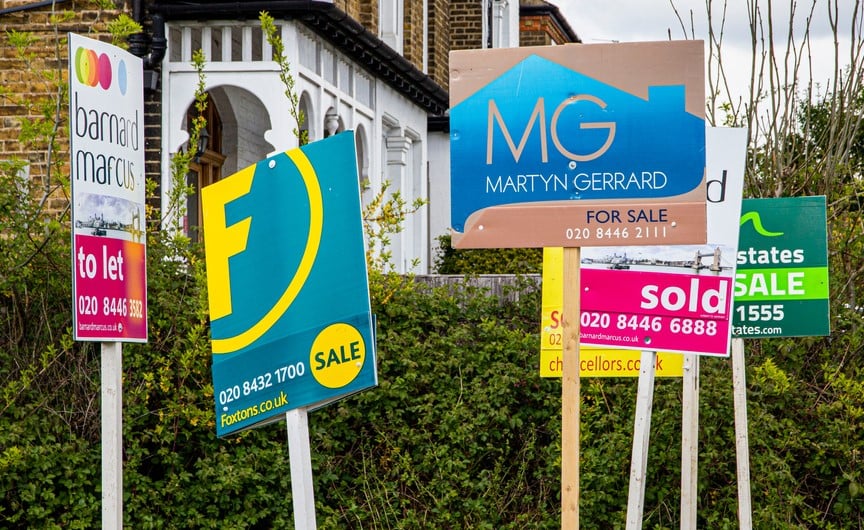
0:05 AM, 4th November 2024, About 3 months ago 1
Text Size
Annual house price growth in the UK slowed in October to 2.4% from 3.2% in September, while monthly growth was a modest 0.1%, one index reveals.
According to the latest figures from Nationwide, market activity has remained resilient in recent months with the number of mortgage approvals approaching the levels seen pre-pandemic.
The lender says that market activity will strengthen – so long as the economy continues to recover.
The research also shows that the jump to 5% for the stamp duty surcharge for additional homes will affect around 194,000 transactions – that’s one in five residential transactions in England and Northern Ireland.
For a typical buy to let purchase, the new rate will add around £4,000 to stamp duty costs – which could dampen investor demand.
Sarah Coles, the head of personal finance at Hargreaves Lansdown, said: “The Budget is set to cause more property woe. It played a role in the slowing of house price growth – even before Rachel Reeves stood up.
“Now the speech has landed, it could mean more failed transactions, more buyers put off by higher stamp duty, and more being priced out of a purchase by rising mortgage rates.
“Landlords rushed to sell ahead of a speech they thought would contain a capital gains tax rise for investment property.
“It meant that extra buyer demand resulted in more sales rather than price rises.”
She added: “The speech did come with a blow for these landlords – but not the one they were expecting.
“Residential property escaped the capital gains tax hike, while the stamp duty surcharge for second properties rose from 3% to 5%.
“It could mean landlords back out of sales that were yet to complete, on the grounds that tax on sales has remained the same, and if they wanted to buy back in later, tax on purchases has risen.”
Tom Bill, the head of UK residential research at Knight Frank, said: “We expect this year’s house price recovery to come under pressure following the increase in borrowing costs triggered by the Budget.
“How much depends on the reaction of bond markets in coming days and the Bank of England’s rate decision and comments next week.
“It appears a ‘mini-Budget’ moment has so far been avoided.”
Director of Benham and Reeves, Marc von Grundherr, said: “A slower rate of house price growth was always to be expected during a Budget month as the housing market pauses for breath to see what the government has up its sleeve, but despite this, the market still recorded positive growth on both a monthly and annual basis which demonstrates just how far we’ve come so far this year.
“Whilst there were no positive Budget initiatives announced that will supercharge market activity, we do expect to see a heightened level of activity between now and March of next year, as homebuyers scramble to complete before stamp duty relief reverts back to previous thresholds.”
The chief executive of Lomond, Ed Phillips, said: “Stability has been the key component to the returning health of the UK housing market and so it’s no surprise that the rate of house price growth slowed during October, with the property sector enveloped by Autumn Statement uncertainty.
“Now that the dust has settled and the property market has escaped largely unscathed, we expect the rate of growth seen across the market to once again accelerate, particularly with further cuts to interest rates on the cards.”
The chief executive of agency Yopa, Verona Frankish, said: “House prices have held firm during Budget month which is an impressive performance in itself despite the rate of growth seen falling month on month.
“The impending stamp duty relief deadline in March of next year will certainly light a fire under those buyers currently progressing through the transaction process or considering a purchase this side of Christmas.”
Mark Harris, the chief executive of mortgage broker SPF Private Clients, said: “Competition among lenders to offer cheaper mortgage rates has boosted housing market activity.
“Many buyers were waiting for rates to come down before taking action and with hopes that the Bank of England will move again and cut rates next week, this will further encourage those who may be wavering.”
Amy Reynolds, the head of sales at estate agency Antony Roberts, said: “House prices seem to be holding steady, with only moderate shifts in value.
“However, the market is marred by some uncertainty among buyers, leading to an increase in properties coming back on the market after fall-throughs.
“These fall-throughs are often due to buyer nervousness, which in many cases is unrelated to the property itself but rather a reflection of economic uncertainty and tightening financial conditions.”
Previous Article
Three silver lining in Labour's BudgetNext Article
Nearly half of renters struggle with mould - survey
Cider Drinker
Become a Member
If you login or become a member you can view this members profile, comments, posts and send them messages!
Sign Up9:23 AM, 4th November 2024, About 3 months ago
The government wants more money from every house sale than ever before. Of course this will impact prices.
As housing forms albeit a small part of GDP figures, lower prices are bad news for the U.K. economy. This makes it more unlikely that Labour will oversee the building of 1.5 million new homes by 2029.